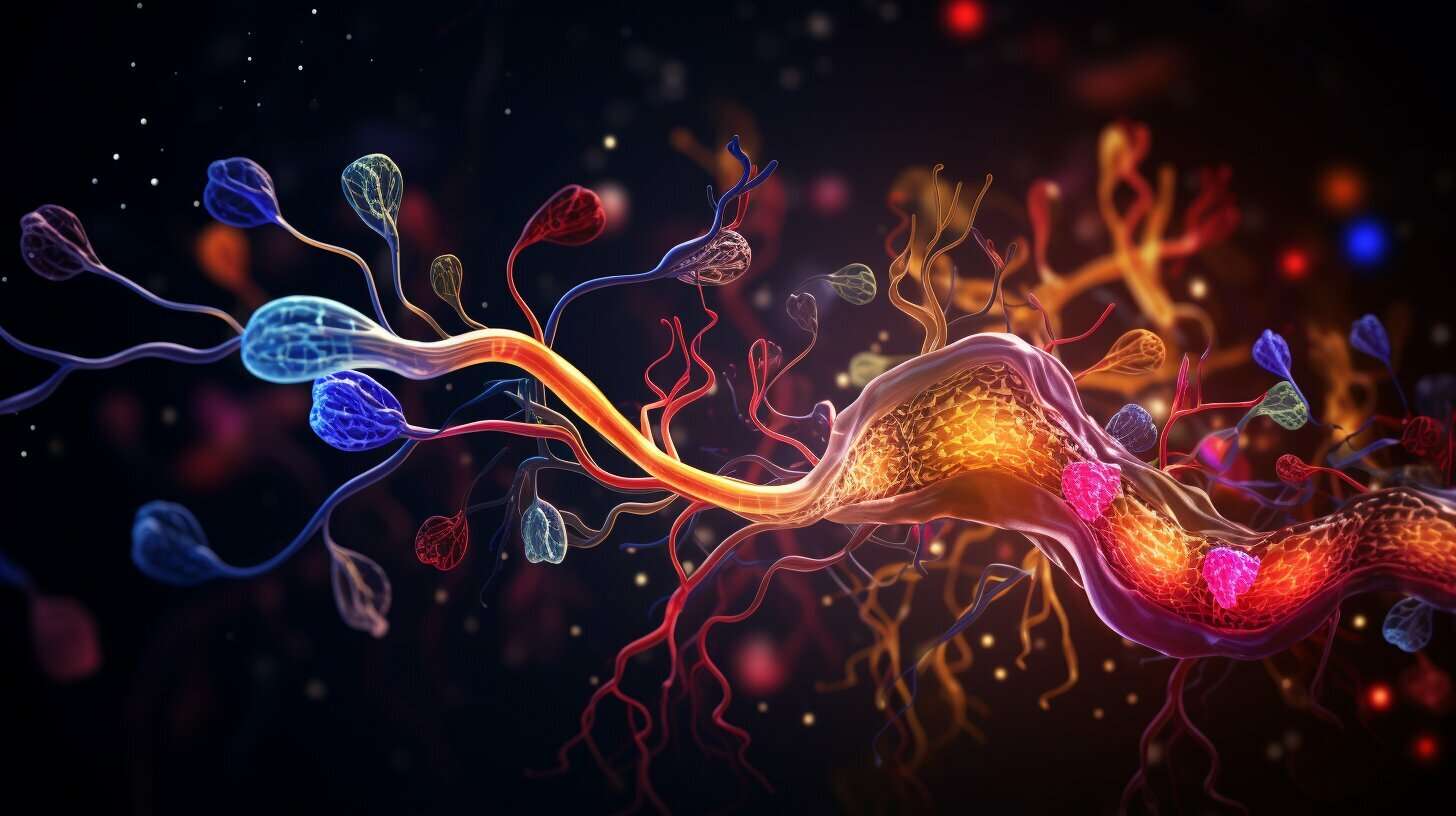Have you ever experienced butterflies in your stomach before a big event or felt your appetite decrease during times of stress? These sensations may suggest that your gut and brain are communicating with each other, and this connection is known as the gut-brain axis or gut-brain connection. Understanding the gut-brain connection is essential to maintaining good health and well-being.
Recent research has shown that the gut and the brain are closely interconnected by a complex network of nerves, hormones, and neurotransmitters. The gut microbiome, which is the collection of microorganisms that live in our digestive tract, plays a crucial role in this connection. The microbiome can influence the brain by producing neurotransmitters such as serotonin and dopamine, which regulate mood, appetite, and sleep.
The gut-brain connection is a two-way street, and research has shown that the brain can also influence the gut. Stress, anxiety, and other emotional states can impact gut function, leading to digestive problems like irritable bowel syndrome (IBS) and inflammatory bowel disease (IBD).
So, why is understanding the gut-brain connection important? By paying attention to your gut health, you may be able to improve your mental well-being, digestion, immune system function, weight management, and even cognitive function.
Key Takeaways:
- The gut-brain connection is a complex network of nerves, hormones, and neurotransmitters.
- The gut microbiome plays a crucial role in the gut-brain connection by producing neurotransmitters that regulate mood and appetite.
- The gut-brain connection is a two-way street, and emotional states can impact gut function.
- Understanding the gut-brain connection is essential to maintaining good health and well-being.
The Role of the Microbiome in Brain Health
Your gut microbiome is made up of trillions of microorganisms including bacteria, viruses, and fungi. The bacteria in your microbiome play a crucial role in your overall health. In recent years, researchers have discovered that the microbiome also plays an essential role in brain health. The gut-brain axis is the communication system between your gut and your brain. It sends signals in both directions and influences your mental and emotional well-being.
The microbiome can impact brain health in multiple ways. One of its essential functions is to produce neurotransmitters such as serotonin and dopamine which are responsible for regulating mood, sleep, and appetite. These neurotransmitters are also involved in the regulation of social behavior.
Research shows that the microbiome can also produce a wide range of other chemicals that can affect brain function. One example is short-chain fatty acids (SCFAs), which are produced when the microbiome breaks down fiber. SCFAs have been shown to have anti-inflammatory effects and can reduce anxiety and depression-like behavior in animal studies.
The Gut-Brain Connection and Mental Health
The gut-brain connection is especially critical in mental health. Studies have shown that people with depression, anxiety, and other mental health disorders often have imbalanced gut microbiomes. There is also evidence that certain strains of bacteria in the microbiome may be associated with improved mood and cognitive function.
Additionally, the gut microbiome can influence stress levels. Chronic stress can negatively affect your gut microbiome by reducing the number of beneficial bacteria. This can lead to a range of health problems, including mental health issues.
The Microbiome and Brain Disorders
The microbiome may also play a role in brain disorders such as Alzheimer’s disease and Parkinson’s disease. Research has shown that people with these disorders have imbalanced microbiomes and altered gut-brain communication. While more research is needed to determine the extent of the microbiome’s role in these conditions, it is an area of great interest in current research.
Overall, the role of the microbiome in brain health is an exciting area of research. It highlights the importance of taking care of your gut health to maintain a healthy brain and body. Eating a diet rich in fiber, fermented foods, and taking probiotics can all help to support a healthy microbiome.

Gut Health and Mental Well-being
The gut-brain connection is a complex and symbiotic interaction that affects not only our digestive system but also our mental health. The gut-brain axis is a bidirectional communication system that involves the central nervous system and the enteric nervous system, which controls the digestive system.
Research has shown that disturbances in the gut-brain axis may lead to mental health issues. When the gut is not functioning correctly, it can cause inflammation and a disruption of the gut-brain symbiosis. This can influence your mood, behavior, and cognitive function, leading to anxiety, depression, and other mental health conditions.
Furthermore, the gut produces neurotransmitters, including serotonin and dopamine, that play a crucial role in regulating mood and emotions. In fact, up to 90 percent of the body’s serotonin is produced in the gut. Therefore, maintaining a healthy gut is essential for mental well-being and cognitive function.
Studies have shown that probiotics and prebiotics can help improve gut health and alleviate symptoms of anxiety and depression. Incorporating fermented foods like yogurt, kefir, and sauerkraut in your diet can also help promote a healthy gut microbiome.
Stress can also impact the gut-brain interaction, leading to digestive issues and inflammation. Practicing stress-management techniques like yoga, meditation, and deep breathing exercises can help reduce stress and improve gut health.

Overall, taking care of your gut health is crucial for maintaining good mental health and cognitive function. By nurturing the gut-brain relationship through a healthy diet and stress-management techniques, you can help promote a healthy gut microbiome, reduce inflammation, and improve your overall well-being.
The Gut-Brain Connection in Digestive Disorders
If you suffer from digestive disorders, it may be worth considering the connection between your gut and brain. The importance of the gut-brain connection in digestive disorders is becoming increasingly evident, and understanding this correlation could potentially lead to more effective treatments.
Research has shown that stress, anxiety, and other emotional factors can significantly impact digestive function. This is because the gut and brain are in constant communication through the gut-brain axis, a complex signaling pathway that allows them to interact and influence each other’s activity.
| Gut-Brain Connection | Correlation with Digestive Disorders |
|---|---|
| Stress | Can exacerbate symptoms of irritable bowel syndrome (IBS) and inflammatory bowel disease (IBD). |
| Depression and Anxiety | Linked to an increased risk of developing gastrointestinal disorders. |
| Gut Microbiome Imbalance | Can contribute to the development of several digestive disorders, including Crohn’s disease and ulcerative colitis. |
In addition to emotional factors, the gut-brain connection can also play a role in the development and management of digestive disorders. For example, studies have found that certain probiotics can help alleviate symptoms of IBS and other gastrointestinal conditions by modulating the gut microbiome and improving gut-brain communication.
To address digestive disorders effectively, it’s important to consider the gut-brain correlation and explore treatments that take into account this connection. By nurturing a healthy gut-brain relationship through diet, stress management, and other lifestyle changes, you may be able to improve your digestive health and overall well-being.

Nurturing a Healthy Gut-Brain Relationship
If you want to optimize your physical and mental health, it’s essential to nurture a healthy gut-brain relationship. Here are some tips to promote this symbiotic connection:
Fuel Your Gut with Prebiotics and Probiotics
Your gut microbiome is made up of trillions of bacteria that live inside your digestive tract. Feeding them with prebiotics, such as onions, garlic, bananas, and oats, can help them thrive.
Probiotics are live bacteria that promote good gut health. You can find them in fermented foods like yogurt, kefir, sauerkraut, kimchi, and kombucha. Incorporate them into your daily diet to improve the diversity and balance in your gut microbiome.
Eat a Balanced Diet
A healthy gut-brain connection also requires a balanced diet. Eating a variety of nutrient-dense foods is crucial for optimal physical and mental health.
Include plenty of whole grains, fruits, vegetables, lean proteins, and healthy fats in your diet. Avoid processed foods, added sugars, and artificial sweeteners, which can disrupt the balance of your gut microbiome and impact your overall health.
Reduce Stress
Stress can have a negative impact on your gut health and disrupt the gut-brain axis. Find stress-reducing activities that work for you, such as meditation, yoga, or deep breathing exercises.
Additionally, ensure you are getting enough sleep and taking breaks when needed. Prioritizing self-care and relaxation can help improve the connection between your gut and brain.
Stay Hydrated
Drinking enough water is crucial for maintaining good gut health and promoting a healthy gut-brain connection. Aim for at least eight glasses of water a day, and avoid excessive alcohol and caffeine consumption, which can dehydrate you.
Remember, nurturing a healthy gut-brain relationship is essential for optimal physical and mental health. Incorporating these tips into your daily routine can help promote a symbiotic connection between your gut and brain.

The Gut-Brain Connection in Neurological Disorders.
Neurological disorders such as Parkinson’s disease, Alzheimer’s disease, and multiple sclerosis have been linked to imbalances in the gut microbiome and dysfunctions in the gut-brain axis. Though more research is needed, studies have suggested that the gut-brain communication plays a role in the development and progression of these disorders.
For instance, Parkinson’s disease is characterized by the accumulation of alpha-synuclein protein in the brain, but research also shows that this protein can originate in the gut and travel to the brain via the vagus nerve. Moreover, people with Parkinson’s disease often experience digestive problems such as constipation and gastrointestinal inflammation years before the onset of motor symptoms.

Similarly, studies have shown that Alzheimer’s disease is associated with imbalances in gut bacteria, leaky gut, and inflammation. Researchers have also found that microbes in the gut produce amyloid proteins that can accumulate in the brain and contribute to Alzheimer’s disease.
Multiple sclerosis, a chronic autoimmune disease that affects the central nervous system, has also been linked to gut dysbiosis and impaired gut function. Research shows that the gut microbiome can modulate the immune system, and changes in gut bacteria can trigger inflammation and autoimmune responses that lead to multiple sclerosis.
While the gut-brain connection is complex and the mechanisms involved in neurological disorders are not fully understood, evidence suggests that maintaining a healthy gut microbiome and gut-brain symbiosis may play a role in preventing and managing these conditions. This may involve adopting a gut-friendly diet, reducing stress, and taking probiotics or prebiotics to support gut health.
Gut-Brain Connection and Immune System Function
The gut-brain connection doesn’t just affect digestion and mental health. It also plays a crucial role in your immune system function. Did you know that about 70% of your immune system resides in your gut? That means that maintaining good gut health is essential for overall health, including immune system function.
Research shows that the gut microbiome communicates with immune cells and helps regulate the immune response. A healthy gut microbiome can help your body distinguish between harmful and harmless substances, preventing chronic inflammation and autoimmune disorders.
On the other hand, an imbalance in gut bacteria can lead to an overactive immune system, causing allergies, asthma, and eczema. Additionally, chronic inflammation in the gut can lead to systemic inflammation in the body, increasing the risk of various diseases, including cancer, heart disease, and diabetes.
Therefore, it is crucial to take care of your gut health to maintain a strong immune system. You can do this by eating a healthy and balanced diet rich in fiber, prebiotics, and probiotics. Exercise, stress reduction, and adequate sleep also support good gut health and overall immune function.
| Tip: | Include fermented foods such as yogurt, kefir, sauerkraut, and kimchi in your diet. These foods provide beneficial bacteria that help promote a healthy gut microbiome. |
|---|
Remember: A healthy gut equals a healthy immune system. Nurture your gut-brain-immune system connection for optimal health.

Gut-Brain Connection in Children’s Health
Children’s gut health contributes significantly to their overall well-being, and the gut-brain connection plays a crucial role in their development. The symbiosis between the gut and the brain has a profound impact on a child’s behavior, mood, and cognitive function. Therefore, nurturing a healthy gut-brain relationship in childhood is critical to promoting optimal growth and development.
Research has shown that the gut microbiome in children’s intestines plays a vital role in modulating brain function. This microbiome comprises trillions of microorganisms that interact with the gut-brain axis to influence cognitive function, mood, and social behavior. An imbalance of gut bacteria can adversely affect a child’s mental and physical health, leading to developmental difficulties.
| Signs of Poor Gut Health in Children: | Ways to Promote a Healthy Gut-Brain Connection: |
|---|---|
|
|
One of the best ways to promote a healthy gut-brain connection in children is to encourage a diverse diet filled with foods rich in fiber and nutrients. This encourages the growth of beneficial gut bacteria, which supports brain health. Some examples include fruits, vegetables, whole grains, nuts, and seeds.
Physical activity is also crucial for maintaining a healthy gut-brain connection. Exercise reduces stress levels, promotes healthy gut bacteria, and improves cognitive function. Adequate sleep is also crucial for optimal growth and development, as it allows the body to rest and repair.
Reducing stress levels is essential, especially for children with an overactive stress response. Chronic stress can damage gut bacteria and disrupt the gut-brain axis, leading to anxiety and depression. Simple stress reduction techniques such as deep breathing, mindfulness, and spending time in nature can help promote a healthy gut-brain connection.

Overall, a healthy gut-brain connection plays a critical role in children’s development, affecting their physical and mental health. To promote a healthy gut-brain axis, encourage healthy eating habits, regular physical activity, stress reduction techniques, and adequate sleep. By taking care of the gut, you can positively influence a child’s future health and well-being.
Gut Health and Weight Management
Did you know that your gut health can have a significant impact on your weight management goals? The gut-brain connection plays a crucial role in regulating your appetite and metabolism, both of which are essential factors in maintaining a healthy weight.
When your gut bacteria are imbalanced, it can lead to cravings for unhealthy foods and overeating, as well as a slower metabolism. This can make it harder to lose weight and keep it off. On the other hand, a healthy gut microbiome can help you feel fuller for longer, boost your metabolism, and reduce inflammation, all of which can improve your weight management efforts.
One key way to nurture a healthy gut-brain relationship for weight management is by eating a balanced diet that includes plenty of fiber-rich, whole foods. Fiber helps keep you feeling fuller for longer, while whole foods provide the essential nutrients your body needs to function properly.
Incorporating fermented foods like yogurt, kefir, and sauerkraut can also be beneficial as they contain probiotics, the good bacteria that help maintain a healthy gut microbiome. Additionally, staying hydrated and getting enough sleep are crucial for weight management as they also affect your appetite and metabolism.
Remember, it’s essential to take a holistic approach to weight management that includes nurturing your gut health. By prioritizing your gut-brain connection, you can make lasting progress towards achieving your weight management goals.

Gut-Brain Connection and Aging
As you age, your gut and brain undergo changes that can impact your overall health. The gut-brain connection becomes increasingly important in maintaining optimal physical and cognitive function.
Studies have shown that a healthy gut microbiome is associated with improved cognitive function and reduced risk of age-related neurodegenerative diseases such as Alzheimer’s and Parkinson’s. The gut-brain axis also plays a crucial role in regulating inflammation, which can contribute to aging-related conditions, including arthritis, heart disease, and cancer.
Research shows that the gut microbiome changes with age, leading to a decline in the diversity of gut bacteria. This decrease in diversity can lead to an increase in harmful bacteria, causing inflammation and dysfunction in the gut-brain axis. As a result, the brain can become more susceptible to age-related diseases.
But there’s good news! You can take steps to nurture your gut-brain relationship and support healthy aging. A diet rich in prebiotic and probiotic foods can promote the growth of beneficial gut bacteria, leading to improved gut health and cognitive function. Additionally, regular exercise has been shown to positively impact the gut microbiome and reduce inflammation.
Remember to prioritize your gut-brain health as you age to support physical and cognitive function. By paying attention to your gut health and being proactive about nurturing a healthy gut-brain relationship, you can improve your chances of aging gracefully and maintaining optimal health.

Conclusion
Understanding the gut-brain connection is essential for maintaining your health and well-being. By nurturing a healthy gut-brain relationship, you can positively impact your mental and physical health, including digestive and immune system function, weight management, and brain health.
Research suggests that the microbiome plays a pivotal role in the gut-brain axis, influencing communication and symbiosis between the gut and brain. Moreover, the gut-brain connection is linked to a range of health conditions, including neurological disorders and mental health.
By taking care of your gut health through a nutrient-rich diet, regular exercise, and stress management, you can support your gut-brain symbiosis and promote overall health and well-being.
FAQ
Q: What is the gut-brain connection?
A: The gut-brain connection refers to the bidirectional communication between the gut and the brain. It involves various mechanisms, including the nervous system, hormonal signaling, and the gut microbiome.
Q: How does the gut microbiome influence brain health?
A: The gut microbiome plays a crucial role in brain health by producing neurotransmitters, regulating inflammation, and influencing the immune system. Imbalances in the microbiome can impact brain function and contribute to mental health disorders.
Q: What is the relationship between gut health and mental well-being?
A: Gut health and mental well-being are closely linked. The gut and brain communicate through the gut-brain axis, impacting mood, cognition, and behavior. Maintaining a healthy gut can support good mental health.
Q: How does the gut-brain connection affect digestive disorders?
A: The gut-brain connection plays a significant role in digestive disorders. The brain can influence gut motility, sensitivity, and the perception of pain. Addressing the gut-brain connection is essential in managing these conditions.
Q: How can I nurture a healthy gut-brain relationship?
A: Nurturing a healthy gut-brain relationship involves maintaining a balanced diet, reducing stress levels, getting enough sleep, and exercising regularly. Probiotics and dietary fiber can also support a healthy gut microbiome.
Q: What is the gut-brain connection in neurological disorders?
A: The gut-brain connection is implicated in various neurological disorders, including Parkinson’s disease, multiple sclerosis, and Alzheimer’s disease. Understanding and addressing the gut-brain axis can potentially offer new avenues for treatment.
Q: How does the gut-brain connection impact immune system function?
A: The health of the gut affects immune system function through the gut-brain interaction. A balanced gut microbiome supports a robust immune system, while dysbiosis can contribute to immune dysfunction and inflammation.
Q: How does the gut-brain connection impact children’s health?
A: The gut-brain connection is crucial for children’s health and development. A healthy gut microbiome in early life can influence immune function, cognitive development, and behavior.
Q: What is the link between gut health and weight management?
A: The gut-brain connection plays a role in weight management. The gut microbiome affects energy metabolism, food cravings, and appetite regulation. Promoting a healthy gut can support weight loss and maintenance.
Q: How does the gut-brain connection change with aging?
A: The gut-brain connection undergoes changes with aging, potentially impacting cognitive function and overall well-being. Nurturing a healthy gut-brain relationship becomes increasingly important in maintaining brain health as we age.






